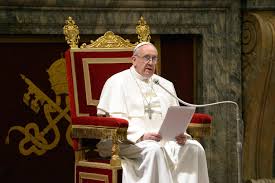Defending Pope Francis – Pt. 1 – Amoris Laetitia

In this first part, in fact, in the first two parts, of my four part series I am calling, “Defending Pope Francis,” I will deal with the controversy surrounding the apostolic exhortation of our Holy Father, Amoris Laetitia (Latin, “The Joy of Love”), promulgated March 19, 2016. To say it has caused quite a stir would be an understatement!
Because my colleague Jimmy Akin has already written an excellent synopsis of it, I was not planning to write about it. But because the questions about Amoris Laetitia, which I will refer to from now on as “AL,” seem to keep coming—some few even accusing Pope Francis of heresy—I decided to jump into the fray. In this post I will outline the controversy.
There are nine chapters in the document, but I am going to focus on chapter 8 (though I will mention other parts as well) and the famous “footnote #351,” which has been the source of virtually all of the questions I have received. Not all, but almost all.
If you have not read the rest of it, I encourage you to do so. There is much in AL that is good, beautiful, and true, and that helps you understand the whole document. It is packed with solid Catholic doctrine and practical application concerning our Faith. But, unfortunately, many seem to have overlooked the good due to the confusion caused mainly by what I argue are faulty interpretations of chapter 8.
Let’s see if we can clear up the confusion.
So what is the controversy?
In a nutshell, Pope Francis made a pastoral and prudential judgment to change the practice of the Church that in the past absolutely, and in every situation, forbade any Catholic who had divorced and remarried outside the Church to receive Holy Communion. No exceptions. Well, almost no exceptions (the Church has always allowed for the reception of the Eucharist for those in danger of death, or in other gravely serious situations, even if they have not been able to Confess mortal sins first).
This is quite a significant door Pope Francis is claiming to have opened here. And this is precisely where the problem begins. Some are claiming the pope to be in grave error here. Some are even claiming him to be a heretic! Ouch!
Folks, let me say here as plainly as I possibly can: Pope Francis is not a heretic. Yes, folks, the pope is Catholic! I can’t believe I actually have to say that! Isn’t that the perennial punch line?
Well, at any rate, in the process of opening this door that was heretofore closed, our Holy Father actually made very clear he was not and is not changing a single doctrine of our Catholic Faith. You can’t be a heretic if you don’t even change or contradict a single definitive Catholic teaching, right? In fact, he did not even change a single law of the Church, notwithstanding all of the accusations to the contrary.
The truth is: Pope Francis simply applied what is already the commonly held teaching of the Church—everyone who commits an objectively grave sin is not necessarily culpable of mortal sin—to the particular situation of some exceptional and rare cases among people who have divorced and remarried without having received an annulment. Folks, that does not change law. It applies existing law in a different way.
Let me explain.
It is indeed the perennial teaching of the Church that in order to commit a mortal sin, one must:
1. Commit an act that is objectively grave.
2. Have knowledge that what he is about to commit is, in fact, a grave sin.
3. Freely engage his will in carrying out that gravely immoral act.
The Church also teaches that there are many factors involved in the process of human persons committing sins that can contribute to decreasing a person’s culpability to the point where he would not be culpable of mortal sin.
In AL 301-302, Pope Francis makes these same points clear, employing first the always lucid teaching of St. Thomas Aquinas (Summa Theologiae I-II, q. 65, art. 3 ad 2; De Malo, q. 2, art. 2) in paragraph 301, and then, and more importantly, the teaching of the Catechism of the Catholic Church, in paragraph 302:
The Catechism of the Catholic Church clearly mentions these factors: “imputability and responsibility for an action can be diminished or even nullified by ignorance, inadvertence, duress, fear, habit, inordinate attachments, and other psychological or social factors” (citing CCC 1735). In another paragraph, the Catechism refers once again to circumstances which mitigate moral responsibility and mentions at length “affective immaturity, force of acquired habit, conditions of anxiety or other psychological or social factors that lessen or even extenuate moral culpability” (citing CCC 2352). For this reason, a negative judgment about an objective situation does not imply a judgment about the imputability or culpability of the person.
This is indisputable Catholic teaching, folks.
So what did Pope Francis say that was so controversial? He merely reiterated what is already Catholic teaching. It is possible that a married Catholic could find himself in a situation where he is divorced and remarried outside of the Church and yet not be culpable of mortal sin. There is nothing new here, folks. According to the perennial teaching of the Catholic Church a person can commit an act involving objectively grave matter, but have his culpability for that sin either reduced to the level of venial sin (as we see in cases of moral acts like masturbation, mentioned in CCC 2352), or even to the point of no culpability at all (as we see in cases where there is invincible ignorance or other psychological factors and social factors, as mentioned in CCC 1735).
If we understand this to be so, the conclusion necessarily follows: A person living in a situation of objective grave sin (divorced and remarried outside the Church, for our purpose here) yet not subjectively and mortally culpable for that sin would not have an impediment to receiving the Eucharist according to divine law.
This brings up another key point. It is the infallible teaching of the Church, and a matter of divine law, that only a mortal sin impedes a validly baptized Catholic from licitly receiving the Eucharist-and I must say again and emphasize-according to divine law. Venial sin does not so impede him. Both the Council of Trent and CCC make this abundantly clear. Behold! Read here the infallible teaching of the Church, and the divine and unchangeable law concerning this matter, according to the Catholic Church:
The Council of Trent, Session 14, Canon 7:
If any one saith, that, in the sacrament of Penance, it is not necessary, of divine right, for the remission of sins, to confess all and singular the mortal sins which after due and diligent previous meditation are remembered, even those (mortal sins) which are secret, and those which are opposed to the two last commandments of the Decalogue, as also the circumstances which change the species of a sin; but (saith) that such confession is only useful to instruct and console the penitent, and that it was of old only observed in order to impose a canonical satisfaction; or saith that they, who strive to confess all their sins, wish to leave nothing to the divine mercy to pardon ; or, finally, that it is not lawful to confess venial sins; let him be anathema.
And CCC 1457 adds:
Anyone who is aware of having committed a mortal sin must not receive Holy Communion, even if he experiences deep contrition, without having first received sacramental absolution, unless he has a grave reason for receiving Communion and there is no possibility of going to confession.
Notice: mortal sins.
Now the Church, as the “dispenser of the sacraments of God” (I Cor. 4:1, Vulgate), also has the authority to establish her own laws that bind Catholics even under the penalty of mortal sin if that law is knowingly and willingly violated. These are what the Church refers to as ecclesiastical laws, or, “church laws.” And Jesus clearly gave that authority to the Church according to biblical texts like Matt. 18:18-in the authority to bind and loose.
Before the advent of AL, it was certainly the practice of the Church-and a binding practice to be sure-that a person who is divorced and remarried outside of the Church could not receive the Eucharist, even if a pastor of souls were to discern him to be merely committing venial sins. Pope St. John Paul II was very clear about this in Familiaris Consortio, 84:
[T]he Church reaffirms her practice, which is based upon Sacred Scripture, of not admitting to Eucharistic Communion divorced persons who have remarried. They are unable to be admitted thereto from the fact that their state and condition of life objectively contradict that union of love between Christ and the Church which is signified and effected by the Eucharist. Besides this, there is another special pastoral reason: if these people were admitted to the Eucharist, the faithful would be led into error and confusion regarding the Church’s teaching about the indissolubility of marriage.
We will re-visit this text from Pope St. John Paul II against those who claim John Paul to have already declared this to be divine law, and not just ecclesiastical, in my next post. But for now, let’s move forward from the perspective that Pope St. John Paul is not making an infallible pronouncement here and claiming this to be either dogma or a matter of irreformable divine law.
We must make proper distinctions. As we saw from the Council of Trent, and from CCC, a Catholic is only impeded from receiving sacraments in the Church, according to divine law, if he is in mortal sin.
Oh, well. Maybe I will give a bit of a preview of my next post here, which includes responding to overstated claims concerning FC 84.
In no way does St. John Paul II claim to be either changing or expanding our Catholic understanding of divine law in FC 84. That would be a very large and serious undertaking. Of course, he could do so. He could expand the law, or our understanding of it, to be more precise, and declare definitively that even venial sins are impediments to receiving the Eucharist in the case of the divorced and remarried. But it would be highly improbable the pope would use what is traditionally a lower-level magisterial instrument like an Apostolic Exhortation to do so. And the language would also be much more definitive, such as the language we saw from the Council of Trent above. Again, more on this in my next post.
The bottom line here is this. According to ecclesiastical law, such as what we find in FC 84, a person divorced and remarried outside of the Church would not have been able to receive the Eucharist licitly even if he was only venially culpable before AL. But again, this is not a matter of divine law. At least, the Church has not so declared it to be.
But there I go again, I get ahead of myself. We will deal with that in my next post.
Pope Francis makes clear this possibility of a person living in the on-going sinful state of being divorced and remarried outside of the Church, yet not being mortally culpable for it, is an “irregular” (AL305) and even “exceptional” (AL307) situation—and thus, I think we could argue, a rare situation. I would think it to be very rare, indeed. But I also think we have to acknowledge that here, on the objective level, the Pope has taught nothing that is contrary to the Faith. He is certainly not a heretic. And we must also admit, at the very least, he is within his rights as pope to make such a statement.
Finally, let’s take a look at the now-famous footnote #351 and, given what we have already discussed, see if we can discover anything nefarious. And remember: this is the footnote commenting specifically on the plight of Catholics in the situation stated above, i.e. they are living in a situation where they are committing on-going sin involving what is objectively grave matter (being divorced and remarried outside the Church), yet they are not mortally culpable:
In certain cases, this can include the help of the sacraments. Hence, “I want to remind priests that the confessional must not be a torture chamber, but rather an encounter with the Lord’s mercy.”. . . I would also point out that the Eucharist “is not a prize for the perfect but a powerful medicine and nourishment for the weak.”
It seems to me we can just “move along here.” There’s “nothing to see.” At least, nothing contrary to the Faith.
In my next post I will identify and respond to multiple of the main objections to Amoris Laetitia as well as to what I have said thus far. Stay tuned.






